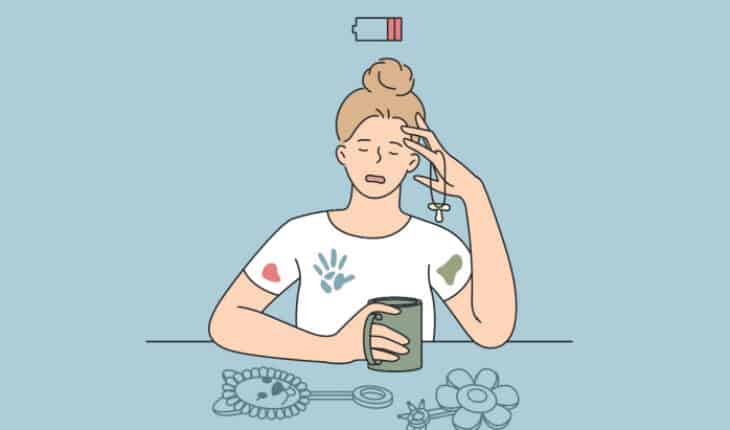Maternal mental health and well-being profoundly impacted by COVID-19 pandemic: Maternal well-being has been profoundly impacted by the COVID-19 pandemic, with a third of women experiencing significant mental health problems and ongoing fatigue and parenting stress, according to a new policy brief.
The brief by the Murdoch Children’s Research Institute found the pandemic had exacerbated underlying mental health difficulties and resulted in some women experiencing depression or anxiety for the first time.
Murdoch Children’s Professor Stephanie Brown said the COVID-19 pandemic led to widespread disruption to work, school and family life, leading to dramatic increases in anxiety, fatigue, irritability, sadness and loneliness.
The Mothers’ and Young People’s Study involved 418 women who completed an online survey between June and October 2020 during Victoria’s second lockdown, and 391 women took part in a subsequent survey between January and April 2021, when many restrictions were lifted.
During Victoria’s second lockdown in mid 2020, 53 per cent of women surveyed experienced fatigue, 41 per cent anxiety, 33 per cent irritability, 27 per cent felt sad, and 21 per cent felt lonely. By early 2021, the proportion of women reporting these difficulties had reduced, but remained higher than pre-pandemic levels.
But fatigue was least likely to have resolved. In early 2021, almost half of women reported they were fatigued, down just slightly from the level reported in mid 2020.
“Much of the responsibility for remote schooling was shouldered by women,” Professor Brown said. For some women, this meant giving up their paid job, taking leave without pay or reducing their hours of work significantly.
“The challenges of remote learning were particularly acute for mothers of children experiencing neurodevelopmental conditions such as ADHD or autism, and for women whose children started at a new school just prior to the pandemic.”
The survey found there was a higher prevalence of depressive symptoms among women who had a history of mental health difficulties. However, one in five women with no prior history of depression reported clinically significant depressive symptoms during the pandemic.
About half of women experiencing clinically significant depressive or anxiety symptoms received support from health professionals. Reasons for not seeking help included prioritising support for their children’s mental health over their own, the cost of services, long waiting periods and lack of confidence in telehealth.
Professor Brown said stress at home and conflict between family members rose during the pandemic.
The survey found two in five women reported problems in their relationship with their current and/or ex-partner. Almost one in 10 reported serious conflict between family members, and about one in four sought health professional support on parenting.
Other key findings included:
- 4 in 5 women in paid employment were stressed about work
- 1 in 4 women reported a loss of income due to the pandemic
- 1 in 10 women who were working prior to the pandemic were no longer working
- 3 in 4 women felt that COVID-19 negatively impacted their oldest child’s progress at school
- 1 in 4 women had concerns about housing stability
- 1 in 4 women reported more stress at home
A previous Mothers’ and Young People’s sub study, focusing on young people, found that mental health difficulties were considerably more common among 14-17-year-olds during the pandemic than in the period prior. Two in five youths experienced mental health problems, and one in five had suicidal thoughts.
Professor Brown said the mental health strategies to support children and young people needed to extend to the whole family.
“It is important to provide multi-service frameworks that enable mothers, fathers, children and young people under 18 to receive appropriately tailored support,” she said.
“The pandemic has highlighted gaps in the current service delivery frameworks, especially for women with limited financial resources. These gaps have resulted in many women in need of mental health support being unable to access mental health services.”
Professor Brown said while pandemic-related restrictions have eased, COVID-19 infection rates remained high.
“Home isolation due to COVID-19 exposure is ongoing and some schools have resumed remote learning due to staff shortages and high infection rates,” she said. These continuing day-to-day effects of the pandemic are likely to have both short and longer-term impacts on women’s workforce participation, their own mental health and well-being and the mental health and well-being of other family members.”
For more about the study and to read the brief, visit strongerfutures.org.au/mothers-and-young-peoples-study
*The content of this communication is the sole responsibility of MCRI and does not reflect the views of the NHMRC.
- Gut microbiome could delay onset of type 1 diabetes - 3rd April 2025
- The da Vinci 5 Robot Is Set To Transform Bariatric Care: - 31st March 2025
- Beyond money: the hidden drivers fuelling child food insecurity - 31st March 2025







Great article shedding light on the crucial issue of maternal mental health during the pandemic. It’s important to recognize the unique challenges faced by mothers and provide them with the support they need. The insights shared here highlight the urgent need for comprehensive mental health services and increased awareness to ensure the well-being of both mothers and their children.